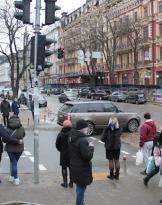A city that apparently is the same as ever, with its multicultural imprint that makes it the spiritual bridge, as well as geographic, between East and West. Taking a look at people and tourists, it seems to be able to say that Istanbul has not suffered any repercussions, as regards customs, customs and expressions of its freedom, due to the authoritarian and conservative policy of President Recep Tayyip Erdogan, his former mayor . Digging deeper, however, the unanimously positive opinions on the recent referendum, on the approval of the citizens towards Erdogan, expressed in the "Asian" Istanbul, arouse some doubts on the effective freedom of expression in a context in which Western clothes of tourists and Turks alternate with the full niqab worn by some women, in a visibly increasing number compared to some years ago. On these figures are concentrated the attentions of the Police and the Army, present in a massive way in front of the centers of major tourist and spiritual interest. Some of these women, who at the niqab also paired the sunglasses that cover the only part left visible by the veil, ie the eyes, is stopped at the entrance to the Blue Mosque.
Turkey does not want to be surprised by new attacks and the controls are tight, even if the city appears "militarized" in a "sober" way, just as convenient as any tourist place in years characterized by the violence of Islamic extremists. This Turkey, which puts Western protection systems in place, recognizing in extremism an enemy that is first of all internal, but seems to be moving further and further away from the West, not only in the proclamations and threats of its president, but also in the concrete everyday events. In fact, a taut air and greater opposition to the government is in Taksim Square, which has always been a symbol of the modern and cosmopolitan face of the city. Here people, if you ask them something, are not afraid to expose themselves and openly declare their "annoyance" for Erdogan's recent actions and his eagerness to increase the power in his hands with the presidentialist breakthrough imprinted with the referendum.

"The votes have been counterfeit," says a boy who is ready to reach the clubs scattered around the pulsing heart of European Istanbul. To determine a series of controversies there is also the beginning of the work to establish a huge mosque on the square, which will be visible in every corner of the city.
"Why did you have to build it right here? - asks a gentleman of about fifty years - It's a provocation ".
The controversy has been posed by the many who consider the prospect of the future as that of a secular country, in which religion does not dictate the rules of cohabitation. Therefore, it is the symbol of that secularism that comes to be struck - and not by chance - by the presence of a new mosque.
"In a country where there are already many, because in the square where young people are opposed to the conservative turns of Erdogan we need to build another? Istanbul is great, places to build are not lacking ", adds a woman who has lived for fifteen years here after moving from Ankara.
In the square, before the rise of Erdogan, we wanted to inaugurate a large shopping center, in line with the vocation of the entire area, characterized by shops and all types of shops. Erdogan, already when he was mayor of Istanbul, had expressed himself in favor of the cult building, which will rise over an area of about 1500 square meters and will be able to accommodate faithful 2500.
The question of Taksim Square, in the concerns of most, would therefore seem completely in line with the wishes that Erdogan publicly expressed in 2015 about the return of the Ottoman Empire. Auspici that especially to young Turks, of all religious faiths, appear inappropriate and out of time. Which of the two souls of Turkey, the most conservative one represented by those who currently govern them or those who want to get closer to Europe, will prevail over the next few years, it is difficult to establish. The current reality, however, speaks, at least through Istanbul, of a country that tries to remain clinging to its European side, but that is pulled more and more towards the Asian bank of the Bosphorus.
(photo of the author)











